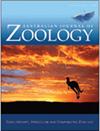Phylogenetic relationships in the Eugongylini (Squamata: Scincidae): generic limits and biogeography
IF 1
4区 生物学
Q3 ZOOLOGY
引用次数: 0
Abstract
ABSTRACT Skinks (Family Scincidae) are the most diverse family of lizards (~1745 described species worldwide), and the Australasian region (Australia, New Caledonia, New Zealand) is a recognised global hotspot (>600 species) for skinks. Here we focus on determining the phylogenetic relationships and biogeography within the tribe Eugongylini, one of three lineages in the region. We used mtDNA (ND2) and nuclear (RAG-1, c-mos) DNA sequences and phylogenetic analyses to reveal the presence of three well-supported lineages of Australian Eugongylini. We found a sister relationship between the monotypic genera Eroticoscincus and Harrisoniascincus, and that the monotypic Anepischetosia has close affinities with Carinascincus coventryi and Pseudemoia. C. coventryi represents a separate lineage from the main Carinascincus radiation. Emoia was not found to be monophyletic, with Emoia s.s. part of an Australian lineage, and the remainder of the genus representing an older divergence within the tribe. The widespread and speciose Cryptoblepharus represented a well-supported lineage within an Australian lineage. Our analyses confirm previous suggestions that four Sphenomorphus species (louisiadensis, minutus, bignelli, and aignanus) are misplaced, and are part of the Eugongylini. Our phylogenetic analyses support the hypothesis that the origin of the tribe lies in Asia, with dispersal events to Africa, Australasia, and Oceania.叶藻属(鳞目:叶藻科)的系统发育关系:属界与生物地理学
石龙子(石龙子科)是种类最丰富的蜥蜴科(全球已知物种约1745种),澳大利亚、新喀里多尼亚、新西兰等地区是全球公认的石龙子热点地区(超过600种)。在这里,我们着重于确定该地区三个谱系之一的Eugongylini部落的系统发育关系和生物地理学。利用mtDNA (ND2)和核DNA (RAG-1, c-mos)序列和系统发育分析,揭示了澳大利亚Eugongylini三个很好的支持谱系的存在。结果表明,单型Eroticoscincus属与Harrisoniascincus属有亲缘关系,单型Anepischetosia属与Carinascincus coventryi和Pseudemoia属亲缘关系密切。C. coventryi代表了一个独立的谱系,从主要的隆香辐射。Emoia没有被发现是单系的,Emoia s.s.是澳大利亚血统的一部分,而该属的其余部分代表了部落内更古老的分化。分布广泛且种类繁多的隐藻代表了澳大利亚谱系中一个得到良好支持的谱系。我们的分析证实了先前的建议,即四个蝶形目(louisiana, minutus, bignelli和aignanus)是错位的,并且是Eugongylini的一部分。我们的系统发育分析支持这个假设,即这个部落起源于亚洲,后来分散到非洲、澳大拉西亚和大洋洲。
本文章由计算机程序翻译,如有差异,请以英文原文为准。
求助全文
约1分钟内获得全文
求助全文
来源期刊
CiteScore
2.40
自引率
0.00%
发文量
12
审稿时长
>12 weeks
期刊介绍:
Australian Journal of Zoology is an international journal publishing contributions on evolutionary, molecular and comparative zoology. The journal focuses on Australasian fauna but also includes high-quality research from any region that has broader practical or theoretical relevance or that demonstrates a conceptual advance to any aspect of zoology. Subject areas include, but are not limited to: anatomy, physiology, molecular biology, genetics, reproductive biology, developmental biology, parasitology, morphology, behaviour, ecology, zoogeography, systematics and evolution.
Australian Journal of Zoology is a valuable resource for professional zoologists, research scientists, resource managers, environmental consultants, students and amateurs interested in any aspect of the scientific study of animals.
Australian Journal of Zoology is published with the endorsement of the Commonwealth Scientific and Industrial Research Organisation (CSIRO) and the Australian Academy of Science.

 求助内容:
求助内容: 应助结果提醒方式:
应助结果提醒方式:


